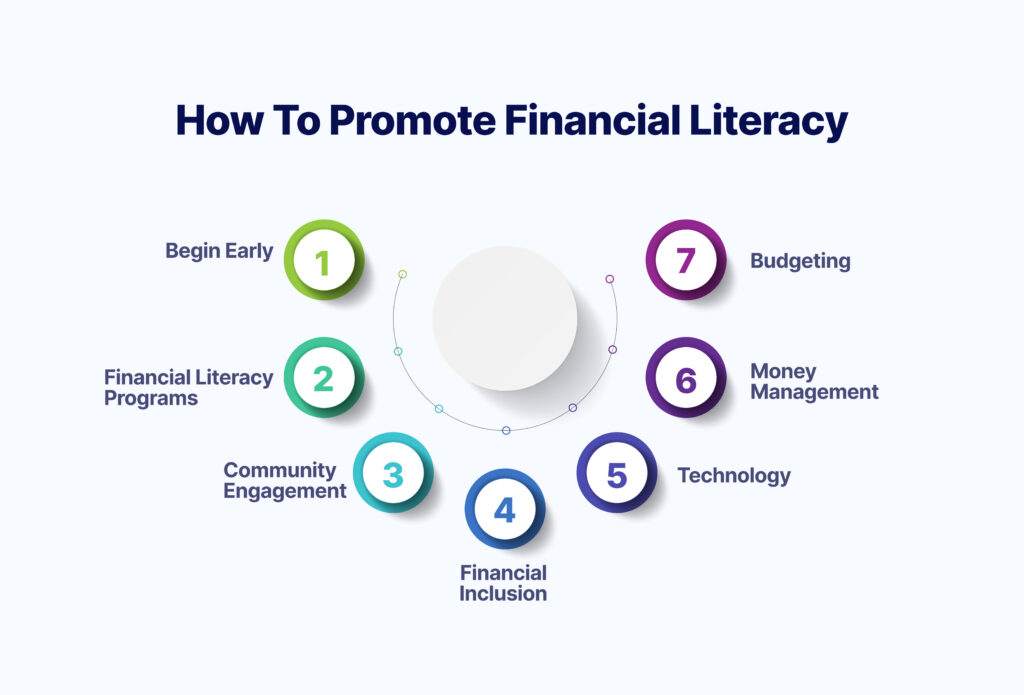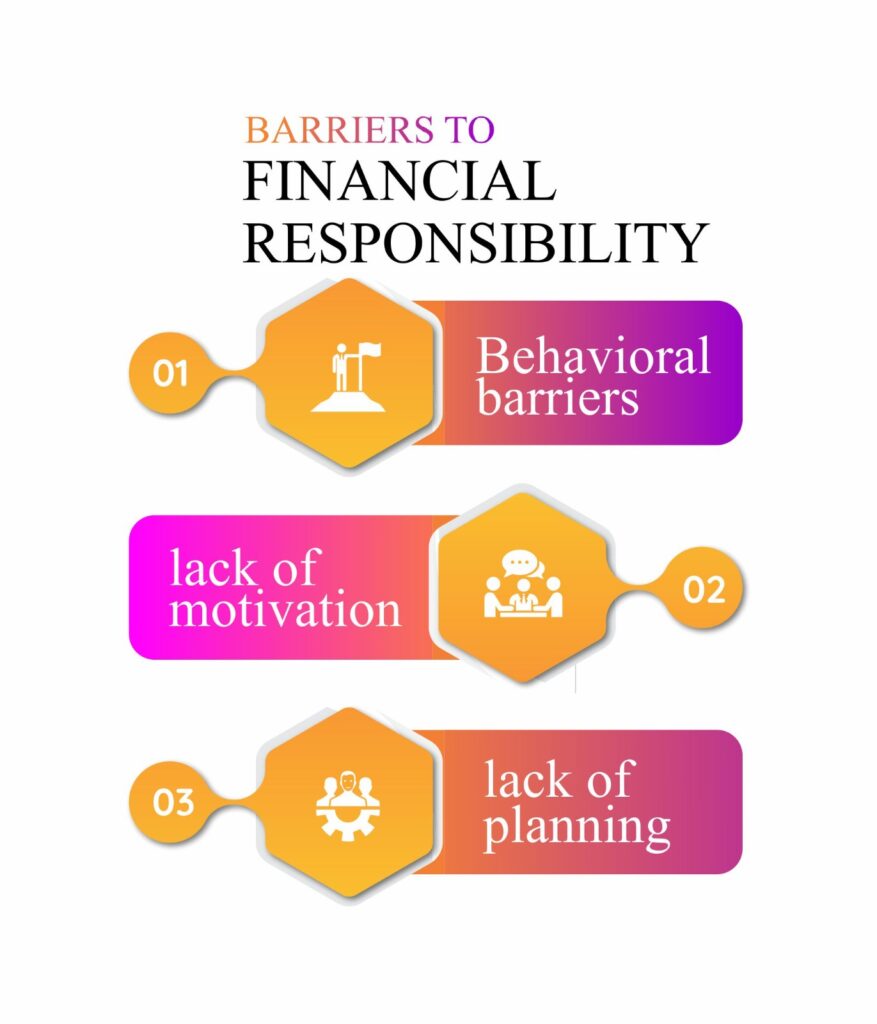Financial literacy and effective money management are critical in this era of rapid technological advancements and dynamic economic landscape. Financial responsibility is an essential component of individual and societal wellbeing. Impacting individuals at all stages of life. We will delve into the critical aspects of financial literacy and why it is important. We will also explore its significance in promoting financial responsibility, as well as current challenges and practical tips for fostering a culture of responsible financial behaviour.
Financial literacy refers to having the capacity to comprehend and apply different financial skills, such as managing personal finances, creating a budget and making investment. Financial literacy gives you the necessary foundation for a smart relationship with money, and it will serve as the bedrock for the continuous learning process of financial management. It is important to begin early, as this will keep you poised to effectively manage your finances and become financially responsible, as knowledge is the key to financial success.
Understanding Financial literacy

A person is said to be financially literate if they have the knowledge and skills required to make sound financial decisions. It covers a wide range of topics, including budgeting, saving, investing, debt management, and an in-depth understanding of financial services and solutions. The goal of financial literacy is to provide individuals with the tools they need to confidently navigate the complex world of finance
The Importance of Financial Literacy
Financial literacy goes beyond knowing and interpreting numbers; it equips individuals with the power to take control of their lives. Consumers who are educated on financial management make better decisions, avoid common pitfalls, and build a solid financial future. Financial literacy offers great benefits not only for individuals but also for society at large, as it promotes economic stability and reduces dependence on government handouts and social welfare programmes.
- Individuals who are knowledgeable in finance and money management are less likely to fall victims of fraud
- Financial literacy helps you set and achieve financial goals, plan for retirement, save for education, manage debts, and run businesses effectively.
- Create a budget and plan every expenditure; no impulse-buying
- Reading books, listening to finance-related podcasts and interacting with experts
Regardless of the increased spotlight on financial education and inclusion, a sizeable portion of the world’s population still does not have basic knowledge about finance. Research shows that a great number of people struggle with basic financial principles such as shares, bonds, investment plans, interest rates, and inflation. This knowledge gap has far-reaching consequences, as individuals may have financial difficulties ranging from inadequate money management to the inability to pay bills, repay loans, or even cater for themselves. All this will eventually snowball into general economic instability in society
Challenges to Promoting Financial Literacy
There are various obstacles that hinder the propagation of financial literacy. For example, the inequalities in the educational system, inaccessibility to financial resources (especially in rural areas), lack of access to technology, and the rapid development of financial products and services. Furthermore, psychological factors such as emotional spending, mood swings, and procrastination all slow down the process of gaining financial literacy.

Begin Early
Starting early is one of the most effective ways to promote financial literacy and improve financial responsibility. Schools should integrate financial education into their curriculum in order for young people to inculcate the basic concepts early in life. The importance of saving, basic budgeting, and understanding interest rates are examples of topics that can be covered. Individuals are better able to face the vicissitudes as they relate to finance if they understand financial management and apply the skills learned in childhood to adulthood.
Financial Literacy Programmes
Organisations play a critical role in improving financial literacy in the workforce by organising periodic trainings, seminars, and workshops. Employees can be taught basic budgeting, managing personal finances, and investment strategies. This will make them financially responsible adults and improve their financial wellbeing.
Community Engagement
Community leaders and local authorities can hold financial literacy seminars and workshops to educate citizens on financial literacy and money management. Communities can organise mentorship programs, equip their local libraries with books on financial literacy. This will encourage members of the community to take control of their finances and become more financially responsible.
Financial inclusion
In order to bridge the inequality gap, organisations and governments must practice financial inclusion by ensuring that all individuals have equal access to the tools and resources they need to manage their finances. Financial literacy programmes must be tailored to meet the specific needs of each community while taking into account the different demographics present in the community. This will in turn foster a sense of belonging and importance in the individual
Technology
In an increasingly digital world, taking advantage of technology to reach a large audience is critical. Financial education can be made more readily available and engaging by using mobile applications, online courses, and interactive platforms. Gaming techniques can be used to teach financial concepts in an engaging and interactive way. This will make learning financial literacy fun and increase learner’s participation and information retention.
Money Management
Money management is an important aspect of financial responsibility. In order to effectively manage this sometimes limited commodity, the following concepts must be understood.
Budgeting
Effective budgeting is at the heart of good money management. Making a budget allows people to track their earnings and expenditures and plan for future goals. Having sound budgeting knowledge helps individuals better manage their resources. Some of the things to consider when drawing up a budget is tracking expenses, which can become over-bloated if not well managed; setting realistic goals-do put too much pressure on yourself; and adjusting your budget as your circumstances change- Remember that change is constant.
Saving
Saving is an essential component of financial responsibility. It is important that you do not spend all that you earn; you must commit to setting aside a certain percentage of what you make as savings. It takes a lot of discipline to do this, as you have to practice delayed gratification. This is achievable with consistency; remember, it is not the amount you decide to save but the consistency and diligence to follow through.
Investments
Investment is another way to grow your money and promote financial responsibility. There are several investment portfolios to choose from; stocks, bonds, the money market, and mutual funds. Whichever one you choose, the goal is to get your money to work for you while you enjoy the benefit of compound interest. At Mintyn, we have different investment plans for you to choose from, starting with as little as 5000 Naira. Do not forget to carry out a risk assessment of the different investment options and make a decision based on financial goals and risk tolerance.
Pay your bills on time
Keeping tabs on your bills shows that you are financially literate; do not allow bills to accumulate and pay them when they are due. There is so much you can do on the Mintyn app, pay your electricity bills, GoTV/DsTV subscription, buy airtime, and so much more. You can set reminders on phone or email so that you do not miss any bills.
Debt Management
Effective debt management is critical for financial wellbeing. Borrowing is good, but it must be done responsibly and strategically. You must have a loan repayment plan. Individuals can regain control of their financial situations by receiving actionable advice on avoiding excessive debts and addressing existing liabilities.
Reduce spending and increase repayments in your budget to stay on top of debt. Create a debt-reduction strategy, such as repaying the loan with the highest interest rate first. If you have too much debt, contact your creditors to renegotiate terms of repayment and consolidate loans.
Prudence vs Stinginess
Most people tend to confuse these two words; they struggle to find a balance between being financially prudent and being stingy. Stinginess is a lack of generosity, an unwillingness to part with money, being miserly, not being willing to share or take financial risks, and not being willing to invest. As a result, you may not grow your money if you do not part with it.
Prudence, on the other hand, is spending money wisely, thinking things through, making the best decision on how to put your money to good use, avoiding unnecessary spending, as well as unnecessary risk- carrying out proper risk analysis. Prudence is crucial if you want to be financially responsible in this era of consumerism and easy credit. Practice conscious consumerism—to put it simply, do not buy on impulse. Think before you spend.
Some Common Personal Budgeting Guidelines
There are two popular guidelines for personal budgeting. They are common because they are easy to implement. The 50/20/30 rule states that you divide your income after tax into three categories, allocating 50% to your needs, 20% as savings, and 30% to your wants. The second rule is only slightly different; the 70/20/10 states that after tax, your income is split into three parts, 70% for expenses, 20% should be set aside for savings and managing your debt, and 10% for investment and charities.

Barriers to Financial Responsibility
- Behavioural barriers: advancing financial responsibility requires an understanding of the behavioural factors that influence financial decisions. Some individuals have a phobia of losing money, which can hold them back from investments that will yield returns. Some people also have cultural and psychological bias; social norms can also influence financial behaviour; lack of discipline; and also lack the consistency to commit to being financially responsible. Individuals can overcome these cognitive biases by developing strategies and implementing principles of financial literacy.
- Lack of motivation: some individuals feel that saving and managing money efficiently are not important. Setting specific and realistic financial goals can be a powerful motivation for good money management. Reading is also a good way to motivate oneself.
- Lack of planning: it is often said that failure to plan is a plan to fail. Developing short term and long term financial goals such as saving to buy a home, funding education, or planning for retirement is critical to being financially responsible. Planning your expenses ahead of time and creating a budget for it helps individuals keep track of their spending.
Ways to Improve Financial Literacy
In order to become financially literate, individuals must understand and master several skills relating to budgeting, saving, bank accounts, debt management and repayment, credit, and investment products like stocks and bonds. Making a budget, tracking expenses, maintaining discipline and prudence regarding saving money, tracking bank statements on a regular basis, and investing for the future are all ways to improve your personal finances.
The role of financial institutions and governments in promoting financial literacy
Financial institutions and local authorities have a critical role to play in promoting financial literacy. Due to the strategic role that banks play, they are better positioned to advance financial literacy in the following ways:
- Educating their customers on the different types of account they can operate
- Providing transparent products and services
- Seamless service delivery
- Promoting ethical financial practices
- Giving good interest rates
Governments, on the other hand, should set up policies and initiatives that promote financial literacy. They can make laws to incorporate financial education in schools and also organise seminars and workshops to reach rural areas and vulnerable communities. Other ways that the government can promote financial literacy include:
- Provide resources and incentives to promote financial literacy and responsibility
- Promote the establishment of strong financial institutions
- Regulate and supervise the stock market and other affiliated institutions
Example of financial literacy
Amaka is a schoolteacher who tries to educate her pupils on financial literacy. She teaches them the fundamental principles of finance, such as; budgeting, personal saving, managing debt, planning for retirement, making investments, tax planning, and insurance. Learning these basic principles early in life sets these students in good stead and makes them better prepared to face the future. They are well prepared to manage money efficiently and make decisions such as renting their first apartment, saving for contingencies, paying taxes, getting health insurance, and general financial planning
Research conducted by Money Confident Kids found that parents who have more than two types of savings are more likely to have their children discuss money with them and less likely to have kids who spend money as soon as they get it or tell lies about how they spend money.
A large number of guidelines set up by government agencies and those who provide financial education uphold that only a well-drafted curriculum is capable of delivering the benefits of financial literacy. Desiring it is not enough, as a shoddily-prepared curriculum will be ineffective for developing the student’s financial capability. The benefits of an appropriate financial literacy programme represent how an individual, when empowered, can tackle any financial challenge life may throw at them.
The ultimate goal of financial literacy is to teach individuals how to earn, spend, save, borrow, and safeguard money. According to the Organisation for Economic Cooperation and Development (OECD), an individual is said to be financially literate if they understand these four key concepts:
- Money and transaction
- Planning and managing finances
- Risk and reward
- Financial landscape.
Finally, promoting financial responsibility through improved financial literacy and effective money management is a collaborative effort. A multifaceted approach is required to address the various demands of individuals across different demographics, from early primary education in schools to financial literacy programmes in the workplace, community engagements, and government policies and regulations. We can contribute to a more financially strong and responsible society by providing people with the knowledge and skills to navigate the complexities of personal finance. As we look into the future, embracing new technologies and remaining committed to continuous learning will be critical to ensuring individuals and society’s financial wellbeing.=

Leave a Reply